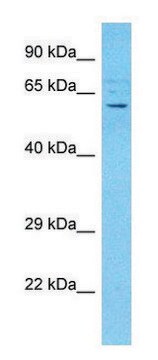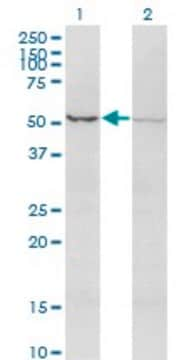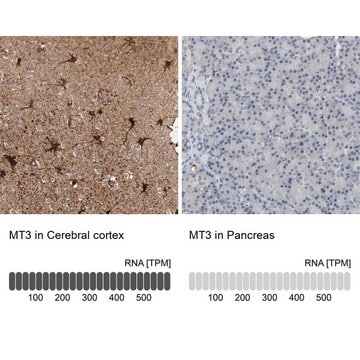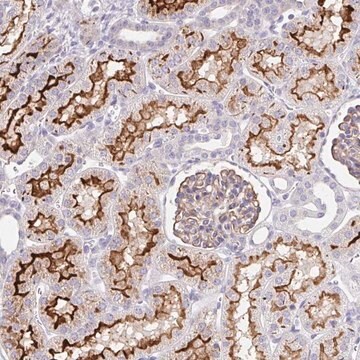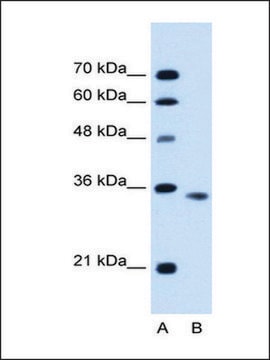A0457
Anti-Activin Receptor IIB antibody produced in goat
affinity isolated antibody
Synonym(s):
ActRIIB
Sign Into View Organizational & Contract Pricing
All Photos(1)
About This Item
Recommended Products
biological source
goat
Quality Level
conjugate
unconjugated
antibody form
affinity isolated antibody
antibody product type
primary antibodies
clone
polyclonal
species reactivity
human
technique(s)
flow cytometry: 10 μL using 1-2.5 x 105 cells (of a 25 μg/mL dilution)
immunohistochemistry: 5 μg/mL
western blot: 0.1-0.2 μg/mL
UniProt accession no.
storage temp.
−20°C
target post-translational modification
unmodified
Gene Information
human ... ACVR2B(93)
General description
Activin is a disulfide-linked dimeric protein released by grandulosa cells in the ovary and sertoli cells in the testis. Activin Receptor IIB belongs to Ser/Thr protein kinase family and can transduce the activin signal from the cell surface to the cytoplasm. Activin will not bind directly to Type I activin receptors rather it will associate with the type II receptor-activin complex and start signal transduction. Many ligands signal through Activin Receptor IIB can regulate muscle growth. Anti-Activin Receptor IIB antibody can be used in flow cytometry and immunohistochemistry. Goat Anti- Activin Receptor IIB antibody reacts specifically with recombinant human activin receptor IIB. The product has shown no cross-reactivity for human activin receptor IA, recombinant human activin receptor IIA or recombinant human activin receptor IB.
Anti-Activin Receptor IIB recognizes recombinant human activin receptor IIB by methods such as immunoblotting and ELISA. The antibody can inhibit receptor-ligand interaction. In ELISA assays, the antibody can block 50% of the binding of recombinant human activin A to recombinant human activin receptor IIB/Fc chimera. Furthermore, the antibody exhibits 15% cross-reactivity with recombinant human activin receptor I. This antibody shows no cross reactivity with recombinant human activin receptor IA, IIA, and IB using ELISA and immunoblotting methods.
Immunogen
purified, NSO-derived, recombinant human activin receptor IIB extracellular domain.
Application
Anti-Activin Receptor IIB can be used in western blotting (working concentration-0.1-0.2 μg/mL) for detecting human activin receptor IIB.
Goat anti-activin receptor IIB antibody can be used for immunohistochemistry (5 μg/mL) and flow cytometry (10 μL) applications.
Physical form
Lyophilized from a 0.2 μm filtered solution in phosphate buffered saline containing 5% trehalose
Disclaimer
Unless otherwise stated in our catalog or other company documentation accompanying the product(s), our products are intended for research use only and are not to be used for any other purpose, which includes but is not limited to, unauthorized commercial uses, in vitro diagnostic uses, ex vivo or in vivo therapeutic uses or any type of consumption or application to humans or animals.
Not finding the right product?
Try our Product Selector Tool.
Storage Class Code
13 - Non Combustible Solids
WGK
WGK 2
Flash Point(F)
Not applicable
Flash Point(C)
Not applicable
Choose from one of the most recent versions:
Already Own This Product?
Find documentation for the products that you have recently purchased in the Document Library.
David W Hammers et al.
EMBO molecular medicine, 9(4), 531-544 (2017-03-09)
Growth and differentiation factor (GDF) 11 is a member of the transforming growth factor β superfamily recently identified as a potential therapeutic for age-related cardiac and skeletal muscle decrements, despite high homology to myostatin (Mstn), a potent negative regulator of
Se-Jin Lee et al.
Proceedings of the National Academy of Sciences of the United States of America, 102(50), 18117-18122 (2005-12-07)
Myostatin is a secreted protein that normally functions as a negative regulator of muscle growth. Agents capable of blocking the myostatin signaling pathway could have important applications for treating human muscle degenerative diseases as well as for enhancing livestock production.
J P de Winter et al.
Endocrinology, 132(3), 975-982 (1993-03-01)
The production of activin by Sertoli cells isolated from 21-day-old rats was studied using the mesoderm-inducing activity of activin on Xenopus laevis animal cap explants, immunoprecipitation and Western blotting. Furthermore, the effects of recombinant bovine activin-A on rat Sertoli cell
L Attisano et al.
Cell, 75(4), 671-680 (1993-11-19)
Transforming growth factor beta (TGF beta) and activin each bind to pairs of membrane proteins, known as receptor types I and II, that associate to form a signaling complex. We report that TSR-I and ActR-I, two human transmembrane serine/threonine kinases
Our team of scientists has experience in all areas of research including Life Science, Material Science, Chemical Synthesis, Chromatography, Analytical and many others.
Contact Technical Service